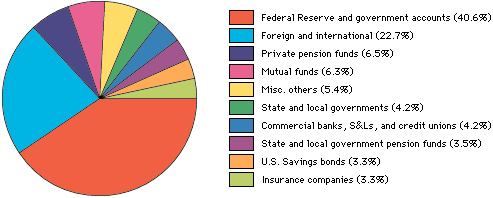Japan + World Begins to Reject US Debt
Posted: April 27th, 2008 by: h2
Well, this one didn’t take long to start happening in real time. Yet another stinking mess the Republicans are leaving whoever replaces them. And don’t think you’ll see a single one of them take even a tiny bit of personal responsibility for systematically gutting the value of the formerly premiere global fiat currency. That talk of responsibility doesn’t actually ever apply to them, just to people they want to criticize.
The Japanese, who own $586.6 billion, or 12 percent of U.S. government debt, had their worst quarter in Treasuries this decade, losing 7 percent in the first three months of the year as the dollar fell to the lowest since 1995 versus the yen…
[…]
“It’s too early to say the dollar will stop falling,” said Masataka Horii, head of the investment team in Tokyo for the $53.1 billion Kokusai Global Sovereign Open, Asia’s biggest bond fund. “The U.S. economy will be slow for a while.”Japan owns more Treasuries than any other nation. After raising their holdings by $9.2 billion to $620.6 billion between March and July 2007, Japanese investors trimmed that stake by $34 billion through February, the Treasury said April 15.
America relies on foreign investors, who own more than half the U.S. government debt outstanding, to finance a deficit that New York-based Goldman Sachs Group Inc. predicts will expand to a record $500 billion for the year ending Sept. 30, after a $163 billion gap last year. Without their support, long-term interest rates would be 0.9 percentage point higher, a 2006 Federal Reserve study found.
Dollar Slide Drives Budget as Japan Shuns Treasuries, Bloomberg
More after the fold. If the thought crosses your mind: if they don’t buy our debt, how will we run a government using deficit spending? crosses your mind, good for you, that means logic is starting to win the battle, finally.
Add another ailment to the U.S. misery index of soaring gasoline and wheat costs and falling home values: a federal deficit that is burgeoning as foreign investors led by the Japanese recoil from the slumping dollar.
[…]
A survey of Japanese funds investing overseas found 58 percent favor euro-denominated bonds, up from 20 percent a year ago, Barclays Capital Japan Ltd., a unit of the world’s fifth- biggest currency trader, said in an April 24 report. Kokusai cut its U.S. fixed income holdings to a record-low 20 percent in March, from 32 percent two years ago.
[…]
“European debt is more attractive than Treasuries,” said Nobuto Yamazaki, executive fund manager at Diam Asset Management in Tokyo, which runs an $8.55 billion bond fund that is Japan’s third-biggest. The euro, which gained 14.5 percent in the past year against the dollar, “will continue to be strong,” he said.Japanese investors have lost 4 percent over the past year after converting interest income and any capital gains into yen, Merrill Lynch indexes show. That compares with a profit of 1.5 percent in Japanese debt and 4.5 percent in German bunds.
[…]
Investors are concerned Treasuries will fall as the Fed stops cutting its target rate for overnight loans because of faster inflation, said Naka Matsuzawa, chief strategist in Tokyo at Nomura Securities Co., a unit of Japan’s biggest securities firm. The cost of wheat and crude oil has almost doubled in less than 12 months, helping push the annual inflation rate to 4 percent in March from 2.8 percent a year earlier.“There’s a high chance the yen will appreciate against the dollar,” said Hirofumi Miyahara, deputy general manager of investment planning at Osaka-based Sumitomo Life Insurance, the fourth-largest. “We’re cautious on Treasuries,” said Miyahara, whose firm is increasing purchases of Japanese debt.
[…]
Asian investors outside Japan are also pulling back. Money managers in China, the second-biggest overseas holder of Treasuries, with $486.9 billion, and South Korea say they favor debt in Europe, equities or commodities.Beijing-based ICBC Credit Suisse Asset Management Co., controlled by China’s biggest bank, said last week Treasuries are “not attractive” because of currency risks. South Korea’s $220 billion National Pension Service in Seoul said yields on the debt have lost their “charm.”
U.S. borrowing costs will rise in the “longer term” because central banks may slowly cut their holdings of dollars to about 30 percent of their reserves in 15 years, from less than 60 percent now, said Kenneth Rogoff, a former chief economist at the International Monetary Fund in Washington.
“The dollar’s primacy in the international financial system is being eroded,” said Rogoff, a professor at Harvard University in Cambridge, Massachusetts. “Foreign investors have done very poorly in U.S. Treasuries.”
Dollar Slide Drives Budget as Japan Shuns Treasuries, Bloomberg
Are you getting depressed yet? If not, you should be. This is the direct result of hiring grotesquely incompetent people to run the country, and of course, also it’s the result of a population lulled into a zombie-like trance in front of their televisions, which have been repeating the same mantra now for generations: buy buy buy….
So let’s take a look at the US total public debt (according to bloomberg, 4.8 billion). I have to admit I don’t quite understand what Bloomberg means by public debt, since the figure I see most often is more than 9 trillion and counting.
But a quick look shows how the numbers come up, the key word is ‘public debt’. As you can see in the following pie chart (from brillig.com/debt_clock/faq.html):

Not such a great picture if you ask me. You can see the official government stats here:
(04/24/2008 5,207,367,063,908.35 4,125,835,077,338.75 9,333,202,141,247.10)
Now do you want to start crying? Any idea how we should start paying this off? Devalue the dollar even more? Whoops, then nobody wants to buy the current new debt.
What to do? A bake sale perhaps?